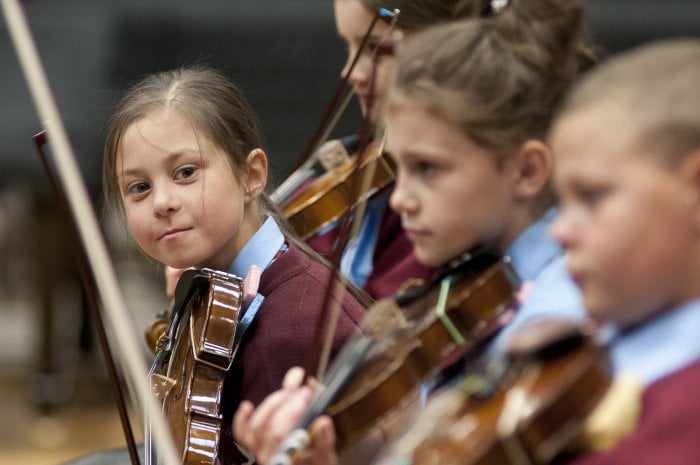
Members of the West Everton Children's Orchestra, the main ensemble of the In Harmony Liverpool programme.
Photo: Reynaldo Trombetta
Funding out of step with In Harmony ambitions
An interim report reveals promising results but an uncertain future for England’s ‘El Sistema’ schools music pilot.
In Harmony, the schools music and social education programme modelled on Venezuela’s ‘El Sistema’, has made “a strong start”, but according to a new report by the National Foundation for Education Research, challenges lie ahead if the scheme is to become sustainable.
Enjoyment and engagement with music are significantly higher at the eleven primary schools involved in In Harmony than at other similar schools, and school staff and practitioners report that the programme develops children’s “instrumental skills and musicianship faster and more thoroughly” than other types of tuition. They are also widely positive about the project’s effect on children’s social and emotional development, and attitudes to learning, although the research did not find statistically significant differences between the In Harmony group and comparator schools. There is still a way to go if the music and social education programme is to find success past its pilot phase. None of the pilot areas investigated have a viable funding plan for 2015 and beyond, and the six areas that are running the pilot scheme operate so differently – led by either a cultural organisation or local authority, and delivering differing types and amounts of musical provision – that there isn’t a clear blueprint for a future model.
The 3-year pilot project is being funded by £3m from Arts Council England and the Department for Education, with the aim of “working for replicability and sustainability of the programme in the longer term”. But headteachers and project managers state they will be unable to continue without external funding for the substantial resources required, including instruments and secure storage; a significant amount of curriculum or extra-curriculum time (between 20 and 50 hours a term for each year group); specialist instrumental teaching; and considerable administration and logistical work. Financial solutions being explored include collaborations with music Bridge organisations, grants from the Department for Education’s Pupil Premium fund, community and local authority funding streams, as well as venture capital financing and philanthropy, but the report concludes that sustainability will present a “major challenge” for the future of the project.
Join the Discussion
You must be logged in to post a comment.